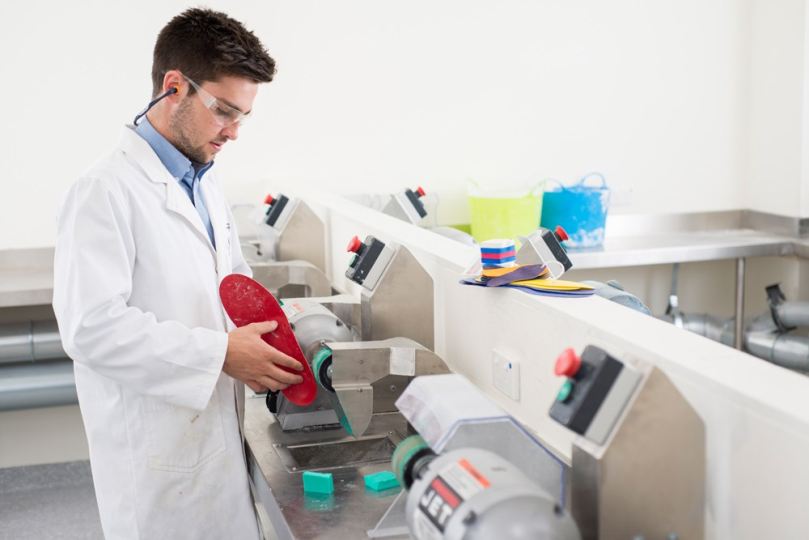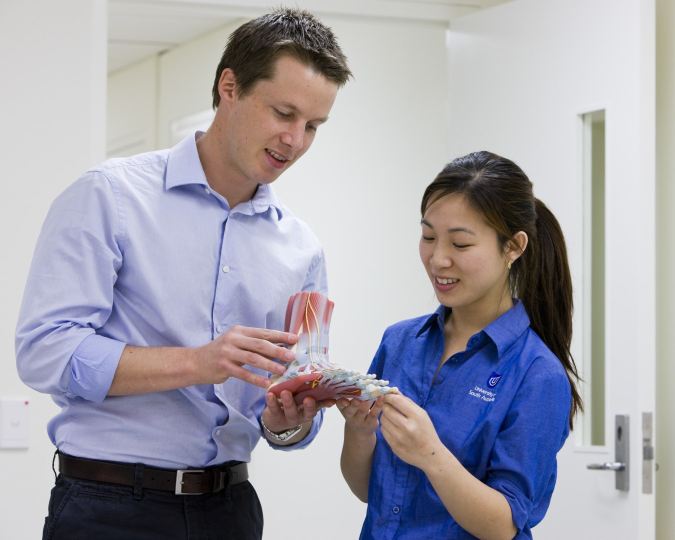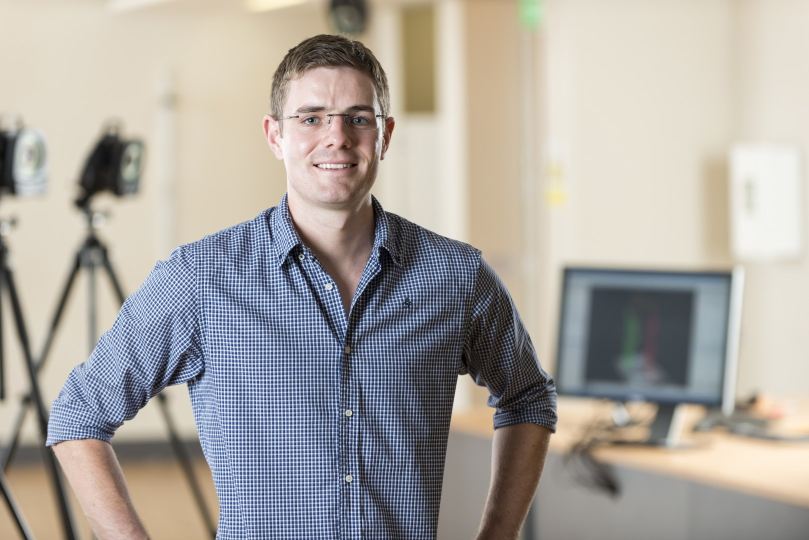Bachelor of Podiatry (Honours)
Degree Level Undergraduate
Year 2025
You're considered an International student if you are:
Degree Level Undergraduate
Year 2025
Program Code
IHOP
Prerequisites
None
Assumed Knowledge
None
Fees
AUD$ 44,300 per annum (per 1.0 EFTSL) for students enrolled in 2025
The admission criteria have been grouped to assist you to easily find the information most relevant to your circumstances. However, you may fit into more than one and the university will consider applicants against each of the relevant criteria.
Certain conditions apply. For more information refer to Appendix 4 of the University's Selection and Entry policy.
This program is for students of the University of South Australia studying in Bachelor of Podiatry with a competitive GPA.
This program is only available to students enrolled in the third year of the Bachelor of Podiatry who have met the GPA requirement. Eligible students will be made an offer into the program directly.
1ComparED (QILT) Graduate Outcomes Survey 2021-23– Full-time Employment Indicator (Domestic Undergraduate). SA public universities. 2Ranked #43, 2024 THE Young University Rankings.
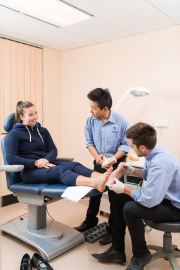
The Bachelor of Podiatry (Honours) is open to currently enrolled, high achieving students who have met the GPA requirement.
As part of your Honours qualification, you’ll study advanced research methods and ethics, as well as develop the skills required to prepare research hypotheses and proposals.
The Bachelor of Podiatry (Honours) program will have you graduate ready to be registered with the Podiatry Board of Australia. You’ll learn to assess, diagnose and manage any disorders of the foot, ankle and lower limb. You will learn practical skills and develop an understanding of the full scope of a podiatrist’s role under the guidance of expert registered practicing podiatrists. You’ll also get the opportunity to put these skills into practice within a vast range of industry organisations across metropolitan and regional placements, giving you first-hand experience into your future career while studying.
Future study opportunities may include doctoral studies.
This honour’s degree is only available to students already studying the Bachelor of Podiatry who have met the grade point average (GPA) requirements and have been made an offer into the degree.
Students who undertake activities where interaction with patients/the public is required for their degree, such as field or clinical placements/visits and in University clinics and gyms, must demonstrate they meet mandatory pre-placement conditional requirements. These include criminal history clearance, child related employment clearance and immunisation requirements. Please visit the Clinical Placement Unit for information on key requirements, and to access the full student checklists.
All students enrolled in a program leading to professional registration must be registered with the relevant national board. The student registration process is completed by the University with the Australian Health Practitioner Regulation Agency (AHPRA) after enrolment. No fees apply.
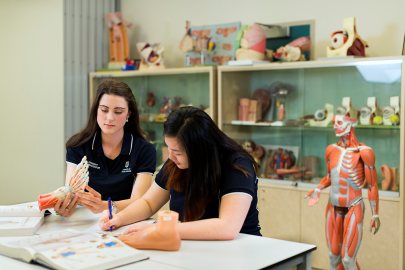
As an honour’s student, you’ll study advanced research methods and ethics, as well as develop the skills required to prepare research hypotheses and proposals with a research project of your choice.
You’ll gain an advanced understanding of both the theoretical and practical aspects of podiatry, as well as the physical, chemical, and social sciences relevant to working in healthcare. The curriculum covers the scope of a podiatrist’s practice, including paediatrics, diabetes, sports injuries, musculoskeletal problems, treatment of the elderly, and general foot care.
During the first year, you’ll cover topics to give you an introduction to health sciences including:
You’ll develop advanced communication skills and explore the assessment and treatment of common problems. The second year will expand your knowledge in clinical sciences, including skills to enable comprehensive and holistic assessment and management of patient conditions. During your third and fourth years, you’ll work on your clinical practice skills, including surgery (and other orthopaedic management), paediatrics, wound management, high-risk foot management, chronic pain and sporting injuries.
Practical learning is a major focus and some of your learning will take place in our on-campus podiatry clinics as well as during external placements in metro and rural SA. You’ll also get the opportunity to practice your podiatry skills with 3D printed feet.
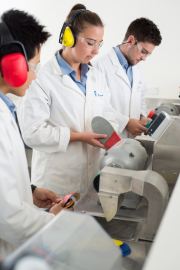
This is your chance to become an expert in foot care. Graduating with an honour’s degree will set you apart from the crowd, ensuring you have a competitive edge and are well-placed for a career in industry, research or further postgraduate study.
UniSA’s enterprising approach to teaching will prepare you with diverse and extensive experience in all areas of podiatry including surgery, sports injuries and related biomechanics, paediatrics and high-risk foot conditions. You’ll graduate with eligibility to become a registered podiatrist.
As podiatrists often work within multidisciplinary healthcare teams, you’ll be exposed to research and learning opportunities in collaboration with other allied health students, as well as in our on-campus podiatry clinics. You'll benefit from learning under the supervision and guidance of registered practicing podiatrists.
UniSA’s podiatry students train in various facilities, including the manufacturing laboratory which has a plaster room and grinder room. This is where you’ll learn how to create orthotics, casts and insoles; and modify shoes for a variety of requirements. As well as learning traditional methods, you’ll get to use the latest technologies, like digital scanners to capture foot characteristics, and prescribe 3D printed foot orthoses to manage foot problems.
You’ll graduate career ready, thanks to world-class teaching, state-of-the-art facilities and practical industry experience. You’ll complete clinical activities involving the provision of screening, education and treatment services in metropolitan and rural areas in a multidisciplinary team with other allied health students.
Gain insight into the fulfilling career of UniSA Podiatry graduate, Ereena Torpey, who is a Senior Podiatrist at Flinders Medical Centre in Adelaide, South Australia.
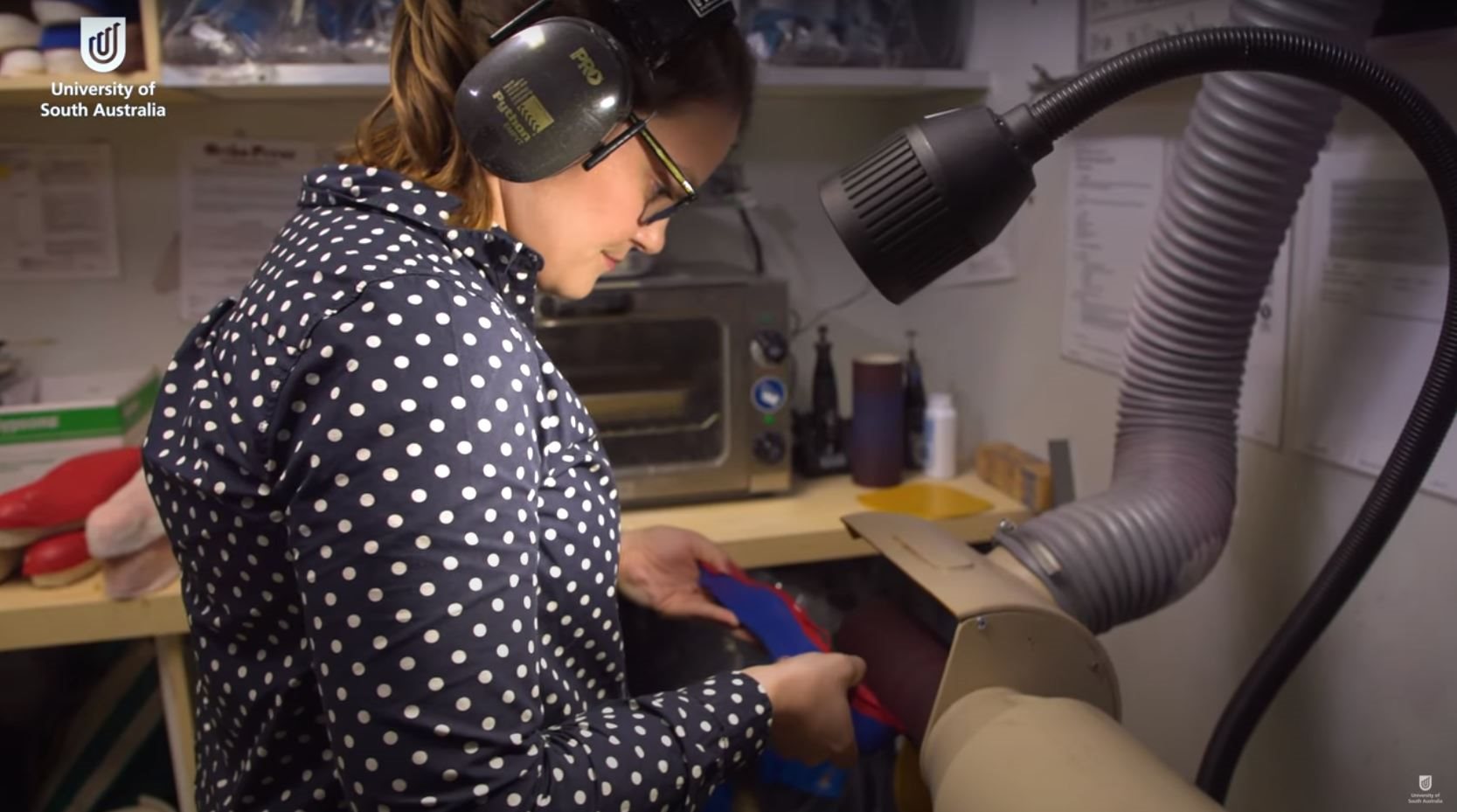
Successful podiatrists possess excellent motor skills for treatment and communication skills for patient care. They can work as individual care providers or as part of an interdisciplinary healthcare team to help manage and treat complex disorders that affect the entire body.
Podiatrists are employed in a range of settings, including:
As an honour’s graduate, you will also be highly qualified to embark on a career in research, or continue your education into a PhD with doctoral study.
The program is recognised for registration as a Podiatrist by the Podiatry Board of Australia.
This honours degree is only available to students studying the Bachelor of Podiatry who have met the grade point average (GPA) requirements and have been made an offer into the degree.
Every year, over 2,500 UniSA students are supported in their studies through scholarships and grants worth millions of dollars. Check out the scholarships below. One of them may be perfect for you. Visit our scholarships page for more.
Recipients can get a 50% reduction on tuition fees for up to four years of full-time study for selected degrees.
Recipients can get a 15% reduction on tuition fees for the duration of their chosen degree.
As a UniSA student, you will have unique access to work placement opportunities, overseas study tours and exchanges, networking events, internships, guest speakers and more.
Our campuses are equipped with state-of-the-art facilities including modern lecture theatres, libraries, workshops and laboratories, as well as spaces that simulate real work environments. These are all supported by the latest technologies and a 24/7 online learning platform. We have health services on campus, gymnasiums, technology zones and great student lounges. You will also gain access to a range of community clinics, which provide professional and cost effective services in areas of health, business, law and psychology. There are campus sport activities to keep you active, and if you are keen to explore the social side of university life, there are movies, cooking demonstrations, parties and lots more.
Adelaide also has a variety of accommodation options to suit different requirements and budgets. Options include dedicated student accommodation and private rentals. See our long-term accommodation pages, or explore our student accommodation by Scape on Bank Street in Adelaide’s lively cultural precinct, an ideal location for students. It is within easy reach of UniSA’s city and metropolitan campuses, Rundle Mall shopping, the Central Market, Chinatown, and the West End’s vibrant nightlife. It is also across the road from the Adelaide train station, and on bus and tram routes.
As a podiatry student, you'll have access to:
You’ll also have access to a range of interesting on-campus spaces including modern lecture theatres, collaborative teaching rooms and relaxed student lounges.

With over two decades of experience podiatry education, research and clinical practice, I am dedicated to supporting the next generation of podiatrists and promoting advanced learning in the field. I am a registered clinician actively involved with industry, and this engagement is reflected in my teaching. I aim to have our students graduate confident to work across the full scope of practice that podiatry offers, which can range from children’s health, gait and foot function issues, surgical practice, foot lesions and prescribing of appropriate medications, footwear design and disability.

There are a number of ways to apply to study UniSA's undergraduate and postgraduate coursework degrees.
You can access our online International Application System through our How to Apply page. The International Application System is an easy and secure online application and acceptance process. You will have visibility of your application through the secure online portal with the ability to download offer documents, submit your acceptance and make a payment.
Alternatively you can submit an application through one of the University's registered Education Agents.
If you are completing an Australian year 12 qualification in Australia or overseas, or the International Baccalaureate (IB) Diploma Programme in Australia, you must apply through SATAC http://www.satac.edu.au/.
If you are applying for the UniSA Study Abroad or Study Abroad Plus program, you can submit your application online here.
Postgraduate study by research
For information on applying to do postgraduate study by research, including Masters by Research, PhDs or Doctorates, please visit http://unisa.edu.au/resdegrees.
There is no closing date for submitting your application however the admissions process takes between one and three weeks from the date that we receive your application and all required supporting documentation.
If you are completing an Australian year 12 qualification in Australia or overseas, or the International Baccalaureate (IB) Diploma Programme in Australia, you must apply through SATAC. Key dates for applications can be found here.
You may be eligible to receive credit or advanced standing for your chosen UniSA degree based on your previous studies, if they are in a related area at an equivalent or higher level. Receiving credit will reduce the number of courses you undertake within the degree, and may also reduce the overall duration of your degree.
The amount of credit you may be eligible to receive is assessed on a case-by-case basis by the Admissions team.
The best way to determine your eligibility to receive credit or advanced standing is to apply using our International Application System which can be found on our How to Apply page. You will need to supply detailed syllabus documents with your application.
UniSA welcomes the opportunity to speak with you regarding your study options. Our staff are able to talk to you about degree information, career outcomes and pathways, entry requirements, applications, and student life, so that you are able to make the best study decision for your future.
Click here to book a 1:1 appointment with one of our enquiries team.
We also have many events throughout the year in Australia and overseas where you can speak with UniSA representatives about your area of interest. View our calendar of events in your home country by selecting the 'International' filter.
Hear from Tom about his rural podiatry placement in Clare
